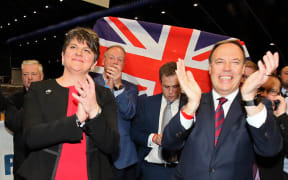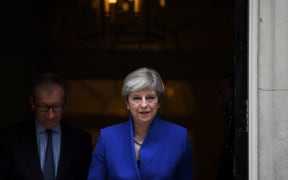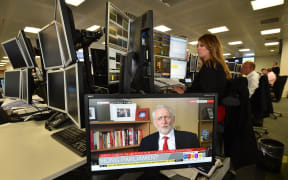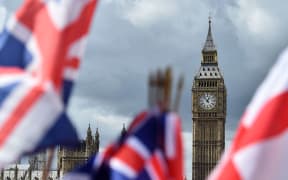Prime Minister Theresa May's two closest advisers have quit after the Conservatives failed to win a majority of MPs in the general election.
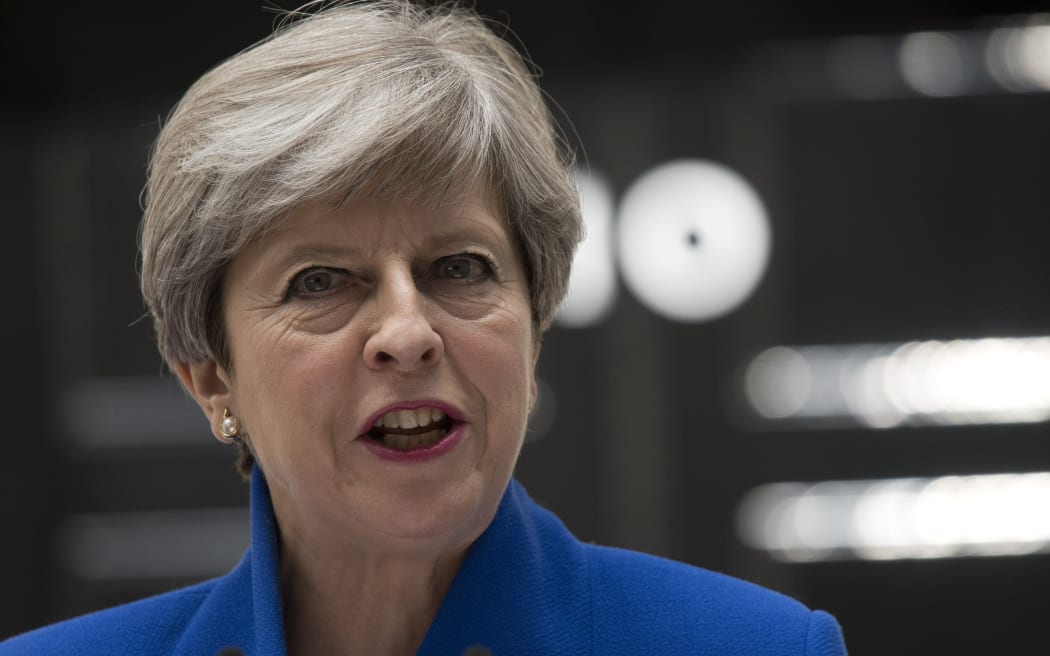
Britain's Prime Minister and leader of the Conservative Party Theresa May, makes a statement that she will form a government with DUP. Photo: AFP
The BBC understands the PM was warned she faced a leadership challenge unless she sacked Nick Timothy and Fiona Hill.
Labour said the pair had "taken the fall" for the prime minister.
Mrs May announced the new Downing Street chief of staff would be ex-Conservative MP and former housing minister Gavin Barwell.
Mr Timothy said he took responsibility for his role in the "disappointing" result and the widely-criticised manifesto package on social care.
Who were these aides?
- Fiona Hill: Fiercely loyal and seen as a formidable operator, Ms Hill was at Mrs May's side for four years at the Home Office, becoming a close confidante of the then home secretary. A former Sky News and Scotsman journalist in her 40s, she led work on the Modern Slavery Act and published her own report on the subject. She was forced to resign as Mrs May's special adviser in a 2014 dispute with Michael Gove over who was to blame for briefing newspapers about an increase in extremism in schools. She was brought back into the fold when Mrs May became PM.
- Nick Timothy: The bearded Brummie is the son of a steelworker, who went to grammar school and joined the Conservative Party at the age of 17. He is credited with influencing the PM's views on social mobility and the need to put the Conservatives "at the service of working people".
His ambition to be a Conservative MP was reportedly thwarted by David Cameron, following a row over special advisers being asked to canvass in a by-election.
Mrs May has said she intends to stay as prime minister and is seeking support for the Democratic Unionists to form a government.
Chief Whip Gavin Williamson is in Belfast to begin formal talks on a deal.
He conceded his party had failed to communicate a sufficiently "positive" message to voters and address their concerns over years of austerity and inter-generational divisions, including over Brexit.
"We were not talking to the people who decided to vote for Labour," he said.
He defended the party's "honest and strong" manifesto, saying controversial proposals to use the value of peoples' homes to fund domiciliary care costs had been discussed in government for months and were not his own personal "pet project".
But he added he took "responsibility for my part in this election campaign, which was the oversight of our policy programme" and "I regret the decision not to include in the manifesto a ceiling as well as a floor in our proposal to help meet the increasing cost of social care".
Ms Hill said it had been a pleasure to serve in government and she believed Mrs May would continue as prime minister.
Norman Smith said he understood that senior Conservatives had warned the PM they would instigate a leadership contest at a meeting of backbenchers early next week if the pair did not leave, and were confident they could get the required 48 signatures to trigger a contest.
One former minister, Anna Soubry, welcomed the clearout, saying it was the "right thing to do" and the PM must "build a consensus" on Brexit and other issues.
David Davis will stay on as Brexit secretary and Sir Michael Fallon will keep his role as defence secretary.
There could be limited changes elsewhere in the cabinet while nine middle-ranking and junior ministers, including Ben Gummer and Jane Ellison, lost their seats at the general election and will need to be replaced.
Labour deputy leader Tom Watson said the PM's advisers had "taken the fall" for Mrs May but tweeted the PM was "responsible for her own defeat".
Earlier, Mrs May's director of communications until the election was announced, Katie Perrior, called the campaign "pretty dysfunctional", telling the BBC she "needed to have a few grey hairs in there who been around a bit and could say 'don't do that'".
As the Conservative leadership begins formal negotiations with the DUP, disquiet is being expressed in some quarters about the move.
Charles Tannock, a Conservative member of the European Parliament, said the DUP - which is opposed to same-sex marriage - was a "hardline, populist, protectionist" party and a "poor fit" as a partner.
The leader of the Scottish Conservatives, Ruth Davidson, has said there are "huge disagreements" between the two parties on gay and women's rights but she does not believe this will stand in the way of Theresa May being able to govern.
Ms Davidson, who is gay and plans to marry her partner in the near future, said she had received "categoric assurance" from Mrs May about the sanctity of LGBTI rights in Scotland where - unlike in Northern Ireland - equal marriage is legal in the event of any deal with the DUP.
Sinn Fein Northern Ireland leader Michelle O'Neill accused the DUP of betraying the interests of the people of Northern Ireland in its agreement with the Conservative government.
"They have once again betrayed the interests of the people of the north by supporting a Tory party which has cut funding to our public services year on year to the tune of hundreds of millions of pounds.
"Experience shows us that unionists have minimal influence on any British government.
Jeremy Corbyn has said Mrs May should "make way" for a government that would be "truly representative of the people of this country".
The Labour leader, who is expected to announce his shadow cabinet on Sunday, said his party was ready to form a minority government of its own, but stressed he would not enter into any "pacts or deals" with other parties.
- BBC
